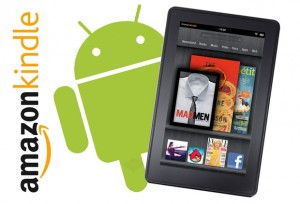 The strength of the Kindle Fire as a tablet tends to be its close integration into Amazon’s web services. Everything from video to eBooks is right there at the touch of a button, integrated seamlessly into your browsing and available practically the second you have an interest in it. In terms of wider functionality, however, it does fall short. There is minimal support built in for alternative file formats, no official access to competing distributers in many cases, and a closely controlled Android Appstore that keep the situation closely within the company’s control.
The strength of the Kindle Fire as a tablet tends to be its close integration into Amazon’s web services. Everything from video to eBooks is right there at the touch of a button, integrated seamlessly into your browsing and available practically the second you have an interest in it. In terms of wider functionality, however, it does fall short. There is minimal support built in for alternative file formats, no official access to competing distributers in many cases, and a closely controlled Android Appstore that keep the situation closely within the company’s control.
This all makes sense from Amazon’s point of view since they are attempting to offer end to end support and persuade customers to stick around entirely inside the provided ecosystem. In fact that last point about the Appstore, despite being inconvenient in a lot of ways, has been a selling point for the Kindle Fire for a lot of people. While the selection is not yet on par with Google’s Android Marketplace, it is also much safer and tends to provide a better working environment. Users might not get the latest patch on a given app until it makes its way through the lengthy screening process, but typically this is only extremely upsetting for highly active developers with rapid release schedules or people who run into issues with a current version who are kept waiting. Anecdotal evidence suggests that this is a tradeoff that many are more than willing to make.
Google has recently announced that they have put in place controls on the Android Marketplace that should do a lot to address this situation, however. Their new service, dubbed “Bouncer”, screens apps for malware automatically prior to their release to customers. It simulates an android phone, runs the app in a sandbox, and tracks behavior against known examples of malware found up to this point. While we are only just now learning of this, Google claims that it has been in effect for some time now and is responsible for a 40% decrease in the number of potentially harmful apps being released.
While this is not at all comprehensive, it is a step in the right direction. Should Google get as proficient at automated screening as they hope to be able to announce in time, it could put a big dent in a majorly favorable aspect of the Kindle Fire. While the general Android experience is likely to remain fragmented, which will always tend to favor consistent experiences like those offered by Amazon and Apple (Apple is much more thorough on this point of course), safety and security are big concerns when using devices that in many cases serve almost exclusively as ways to purchase media in a convenient manner. Learn how to open BIN file.
It is unlikely that this is a direct response to the Kindle Fire on the part of Google. They have plenty going on right now in general and despite Amazon’s managing to snag the top slot in terms of most used “Android” tablet, things are clearly doing well for the company in general. With Windows 8 right around the corner though, it is increasingly important to bring everything to bear to secure customer loyalty. The Kindle Fire is a step in that direction that would be too extreme for the vast majority of Android device developers, but some of its strengths may serve well as examples.